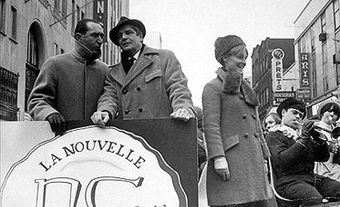
25th Street Theatre Centre
25th Street Theatre Centre (originally 25th Street Theatre) of Saskatoon was founded in 1971 as an artists' collective by University of Saskatchewan drama students. It began production in 1972 with Gardens, Sketch #1 by Andras Tahn, who became the theatre's first artistic director when the collective reorganized over 1974-75 to become a professional theatre company. Under Tahn's leadership, the theatre developed primarily as a populist grassroots company, producing plays and collective creations on Prairie subjects, but also as a venue for new plays from other regions. It is best known for Paper Wheat (opened 1977), a collective documentary collage on the history of the Saskatchewan Wheat Pool, which toured nationally in 1978 and 1979, and which was the subject of a National Film Board documentary (1978).
Other collectives at this time included If You're So Good Why Are You in Saskatoon? (1975), directed by Paul Thompson; and Generation and 1/2 (1978), a continuation of the Paper Wheat story of the Wheat Pool. Other premières included Brad Fraser's first play, Wolfboy (1978); Andras Tahn's Jacob Kepp (1979); Layne Coleman's Queen's Cowboy (1979); Jim Garrard's Cold Comfort (1981); Linda Griffiths and Patrick Brymer's O.D. on Paradise (1980); Marc Diamond's The Ziggy Effect (1980); and Maria Campbell, Linda Griffiths and Paul Thompson's Jessica (1982). Griffiths was also one of 3 short-term artistic or co-artistic directors, including Layne Coleman and Gordon McCall, who helped steer the theatre over the difficult transitional years of 1980-84.
Under the artistic directorship of Tom Bentley-Fisher (1985-97), 25th Street Theatre continued to serve its mandate of producing grassroots theatre with premières of plays by many Saskatchewan writers, including Ken Mitchell's The Plainsman (1985) and Melody Farm (1987); Don Kerr's The Great War (1985), Talking Back (1989) and Talkin' West (1992); Connie Gault's Sky (1989); Rod MacIntyre's Nice Guy (1990) and Blue Zone (1996); Barbara Sapergia's Roundup (1990); Archie Crail's Exile (1990); Dianne Warren's Serpent in the Night Sky (1991), Club Chernobyl (1992) and The Last Journey of Captain Harte (1997); Bruce Sinclair's Dreamkeeper (1991); Greg Nelson's Sidney (1992) and Spirit Wrestler (1995); Sharon Butala's Rodeo Life (1993); Mansel Robinson's Colonial Tongues (1993); Kit Brennan's Magpie (1993); Ann Szumigalski's Z...A Meditation on Oppression, Desire and Freedom (1994); Pamela Bustin's Saddles in the Rain (1994); Maria Campbell and Harry Daniel's One More Time (1995); Joe Welsh's Sacred Places (1997); and Henry Woolf's Bim and Bub (1997).
Under Glen Cairns (1998-99) the theatre initiated the annual Her-icane Festival of Women's Art (1999-2007). Unfortunately, ongoing artistic, space and financial issues exacerbated by a chilly economic climate led to the theatre's decision to move out of active production in 2000. Today, it largely fulfills its mission "to promote and present artist-driven professional theatre" by continuing to run the Saskatoon Fringe Festival every summer.

 Share on Facebook
Share on Facebook Share on X
Share on X Share by Email
Share by Email Share on Google Classroom
Share on Google Classroom

